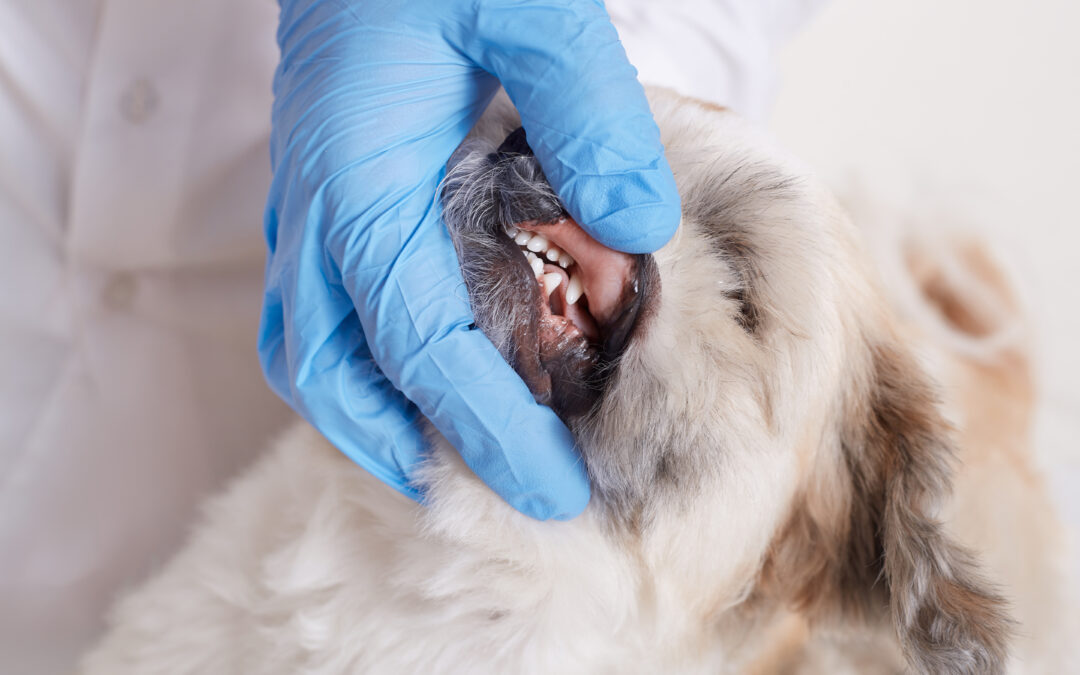When it comes to your pets, keeping them healthy is probably one of your top priorities. Annual check-ups, vaccinations, and paying attention to signs of illness or abnormalities is all things that become routine for any pet owner. One thing that can easily get overlooked, though, is your pet’s dental health. Although the vet will check your dog or cat’s teeth when they go in for a wellness check, it’s more important than you think to keep up daily dental health for your pet at home.
Over 80% of dogs and 75% of cats have some sort of dental disease by age 3. Periodontal disease is the most common form of dental disease, affecting the teeth and the gums. It begins when plaque buildup containing bacteria and food particles form on the teeth, which eventually turns into tartar. Although the tartar can be easily removed during a pet dental cleaning, it does not mean that your pet’s mouth is disease-free. When tartar goes below the gumline, it can damage the teeth and lead to infection which can then result in dental surgery or teeth extraction. Dental disease can also spread through the bloodstream and cause a weakened immune system, and heart, liver, and kidney problems.
How Do You Know Your Pet Has Dental Disease?
There are several signs and symptoms to look for. One of the easiest signs to look for is bad breath. Although you might think a smelly mouth is just a common trait for dogs and cats, bad breath that does not go away or gets worse can be an indicator that something is wrong.
Other common symptoms are:
- Mouth pain
- Problems chewing
- Bleeding gums
- Broken or loose teeth
- Difficulty eating or drinking
- Drooling
If your dog or cat is experiencing any of these signs or symptoms, it’s important to reach out to your vet or to personal pet care services who are certified in pet dental care who can do a more thorough exam of your pet’s teeth.
How You Can Help Keep Your Pet’s Teeth Healthy at Home
Oral disease can be easily treatable. Many pet owners may think that giving their dog or cat dental chews and treats is enough to keep their teeth in shape, but that’s not the case. While special dental treats can assist in keeping their teeth healthy, routine home care is an essential part of maintaining your pet’s oral health. Brushing your pet’s teeth daily, using dental wipes, and rinses are all crucial to giving your pet a healthy mouth. Though your pet may be resistant at first, start making it a regular daily routine by rubbing a cloth or soft gauze across the teeth with your finger. Once they have become accustomed to that, you can introduce a specially designed pet toothbrush and toothpaste. Scheduling a non-anesthesia pet dental cleaning twice a year with V.I.C. Pet Care, will also help your pet prevent periodontal disease. If we are not in your area, we recommend that you schedule with another reputable pet dental service or pet dental center in order to maintain a good preventative care plan for your pet. An annual trip to your vet for a routine check up is also recommended even if you don’t recognize any symptoms or signs of poor health.
Just like humans, what your pet eats can also affect the condition of their teeth. While they may not be chowing down on sugary sweets, regular table scraps can increase the formulation of plaque and tartar on your pet’s teeth. Crunchy dry pet food can help clean the plaque off their teeth and some food is even specifically formulated to reduce plaque and tartar.
It’s important to remember that it is never too late! Your pet is never too old to begin routine dental care. The older your pet gets, the more likely they are to develop oral disease so taking preventative steps and being proactive about your pet’s dental hygiene can help them live a happier, healthier life!

